

Kachru's three circles model. The English language is the world's Achilles heel. English has achieved prime status by becoming the most widely spoken language in the world – if one disregards proficiency – ahead of Mandarin Chinese and Spanish.

English is spoken in 101 countries, while Arabic is spoken in 60, French in 51, Chinese in 33, and Spanish in 31. From one small island, English has gone on to acquire lingua franca status in international business, worldwide diplomacy, and science. But the success of English – or indeed any language – as a “universal” language comes with a hefty price, in terms of vulnerability. Problems arise when English is a second language to either speakers, listeners, or both. No matter how proficient they are, their own understanding of English, and their first (or “native”) language can change what they believe is being said. When someone uses their second language, they seem to operate slightly differently than when they function in their native language. And there is more. Is the English language too powerful? – The European Sting - Critical News & Insights on European Politics, Economy, Foreign Affairs, Business & Technology - europeansting.com.
UN Photo Highly skilled interpreters perform a vital service at UN meetings, where delegates come together to present their views in one of the six official languages or in their own tongue.
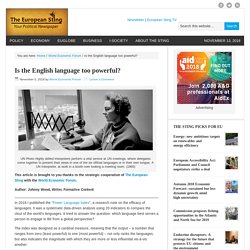
A UN Interpreter, at work in a booth over looking a meeting room. (1965) This article is brought to you thanks to the strategic cooperation of The European Sting with the World Economic Forum. Author: Johnny Wood, Writer, Formative Content. Have we reached peak English in the world? In China last month, Theresa May attended the launch of the British Council’s English is Great campaign, intended to boost interest and fluency in our national language.
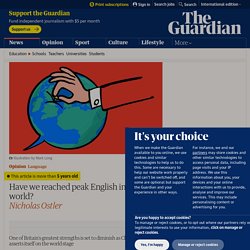
This might sound like Donald Trump’s notorious “Make America great again”, but comes in fact from a stronger position. Beyond doubt, the use of English is greater than ever, and far more widespread than any other language in the world. All non-English-speaking powers of our globalised world recognise it as the first foreign language to learn; it is also, uniquely, in practical use worldwide. KC Power Language Index May 2016. Behemoth, bully, thief: how the English language is taking over the planet.
On 16 May, a lawyer named Aaron Schlossberg was in a New York cafe when he heard several members of staff speaking Spanish.
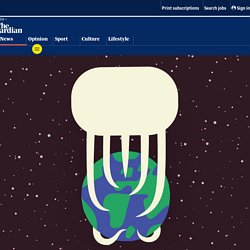
He reacted with immediate fury, threatening to call US Immigration and Customs Enforcement and telling one employee: “Your staff is speaking Spanish to customers when they should be speaking English … This is America.” A video of the incident quickly went viral, drawing widespread scorn. The Yelp page for his law firm was flooded with one-star reviews, and Schlossberg was soon confronted with a “fiesta” protest in front of his Manhattan apartment building, which included a crowd-funded taco truck and mariachi band to serenade him on the way to work. Mind your language: the fightback against global English. English is the language of business and science.

The government in Rwanda, and many people in Tunisia, prefer it to French. Singapore makes sure every child is fluent in it. It is the world’s lingua franca, the key to success for every ambitious parent and a central part of the curriculum of every sensible school. Sample the FT’s top stories for a week You select the topic, we deliver the news.
BBC Radio 4 - The Battle for English. Will Brexit spell the end of English as an official EU language? Now that we know that Boris Johnson will “get Brexit done” by the end of January 2020, what are the implications for English as an official language of the European Union and in the European parliament?
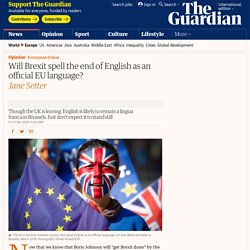
Could it stop being used when Britain leaves? In 2016 Danuta Hübner, an MEP and chair of the European parliament’s constitutional affairs committee, was quoted as saying, “If we don’t have the UK, we don’t have English.” Can computer translators ever beat speaking a foreign tongue? Image copyright Getty Images Put crottin de chèvre into Google Translate, and you'll be told it means goat dung.

So if it appeared on a menu, you might pass. Can English remain the 'world's favourite' language? Is the era of artificial speech translation upon us? Noise, Alex Waibel tells me, is one of the major challenges that artificial speech translation has to meet.
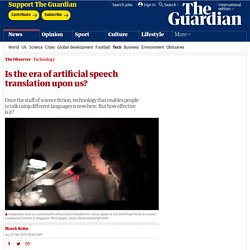
A device may be able to recognise speech in a laboratory, or a meeting room, but will struggle to cope with the kind of background noise I can hear surrounding Professor Waibel as he speaks to me from Kyoto station. I’m struggling to follow him in English, on a scratchy line that reminds me we are nearly 10,000km apart – and that distance is still an obstacle to communication even if you’re speaking the same language.
We haven’t reached the future yet. If we had, Waibel would have been able to speak in his native German and I would have been able to hear his words in English. He would also be able to converse hands-free and seamlessly with the Japanese people around him, with all parties speaking their native language. Language translator Pilot fits inside your ear to translate in real-time. If trying to order dinner or find your hotel abroad fills you with fear due to your abysmal grasp of foreign languages, don't panic.

A forthcoming in-ear gadget is claimed to be able to translate speech like the Babel Fish in The Hitchhiker's Guide to the Galaxy, or the Universal Translator gadget in Star Trek. The system, dubbed the Pilot, comprises two earpieces to be worn by two people who do not speak the same language and uses an app so the duo can converse with ease. Scroll down for video The Pilot system comprises two earpieces (shown in three colours above) to be worn by two people who don't speak the same language It is claimed to be the first 'smart earpiece' capable of translating between two languages.
The company behind the technology, Waverly Labs, said: 'This little wearable uses translation technology to allow two people to speak different languages but still clearly understand each other.' Is English or Mandarin the language of the future? 22 February 2012Last updated at 01:03 By Jennifer Pak BBC News, Kuala Lumpur English has been the dominant global language for a century, but is it the language of the future?
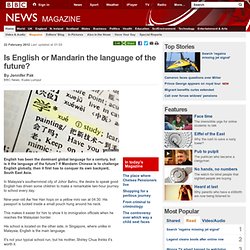
If Mandarin Chinese is to challenge English globally, then it first has to conquer its own backyard, South East Asia. In Malaysia's southernmost city of Johor Bahru, the desire to speak good English has driven some children to make a remarkable two-hour journey to school every day. Nine-year-old Aw Yee Han hops on a yellow mini van at 04:30. His passport is tucked inside a small pouch hung around his neck. What the World Will Speak in 2115. In 1880 a Bavarian priest created a language that he hoped the whole world could use.
He mixed words from French, German and English and gave his creation the name Volapük, which didn’t do it any favors. Worse, Volapük was hard to use, sprinkled with odd sounds and case endings like Latin. It made a splash for a few years but was soon pushed aside by another invented language, Esperanto, which had a lyrical name and was much easier to master. World Englishes: 30 countries with a million English speakers. OED looks for words used worldwide to reflect global nature of English Global English. The development of English as a global language is one of the most remarkable phenomena of the late 20th and early 21st centuries. For the first time in the history of human society, a single language has become sufficiently universal that it can be used as a global lingua franca for communication between speakers of many languages.
The history of English has traditionally been divided into three main phases: Old English (450-1100 AD), Middle English (1100-circa 1600 AD) and Modern English (since 1600). But it seems that Global English represents a new and fourth phase in which its main use around the world is between non-native speakers - a phase of its history which has only just begun and in which both the status and linguistic form of the language are rapidly developing. Creative commons image Credit: cosmonautirussi 11 via Flickr Bilingual signage in Germay [Image:cosmonautirussi 11 under CC-BY 12 licence]
Brexit could create a new ‘language’ – Euro-English. Brexit could lead to the development of a new form of the English language, according to a new academic paper. Dr Marko Modiano, of Gavle University in Sweden, said there were already signs that “Euro-English” was developing its own distinct way of speaking. And this could eventually be codified in a dictionary and taught in schools in much the same way that American or Australian English is today if English is retained as the lingua franca of the European Union after the UK leaves.
The Europeans might also decide to adopt American spellings, Dr Modiano said, which would add about 443 million to the total population using that system. Euro-English has already developed its own new definitions for some words based on the “Eurospeak” deployed in Brussels. For example, “eventual” is now used as “a synonym for possible or possibly”, Dr Modiano wrote in the journal World Englishes. Mark Steel: Brexit shows that we're finally getting our country back. Post-Brexit, is English Still The Language of The Global Business World? There are a staggering 1.6 billion people who speak English as a second language. China for example, now has around 10 million fluent English speakers. It’s an official language of NATO, the UN and, for the time being at least, the EU. English, French and German are the three dominant languages of the EU, however once the UK leave, the only EU States where English is still considered a first language will be Ireland and Malta who collectively account for less than 1% of the EU’s population.
There are calls from across the channel to do away with English in the EU. The Greeks had a word for it … until now, as language is deluged by English terms. Usually, Professor Georgios Babiniotis would take pride in the fact that the Greek word “pandemic” – previously hardly ever uttered – had become the word on everyone’s lips. After all, the term that conjures the scourge of our times offers cast-iron proof of the legacy of Europe’s oldest language. Wholly Greek in derivation – pan means all, demos means people – its usage shot up by more than 57,000% last year according to Oxford English Dictionary lexicographers.
But these days, Greece’s foremost linguist is less mindful of how the language has enriched global vocabulary, and more concerned about the corrosive effects of coronavirus closer to home. The sheer scale of the pandemic and the terminology spawned by its pervasiveness have produced fertile ground for verbal incursions on his mother tongue that Babiniotis thought he would never see. “We have been deluged by new terms and definitions in a very short space of time,” he told the Observer. Babiniotis has a point, she says. ‘Globish’: why France has a love-hate relationship with global English. © AFP/Getty Images The Salon du Livre in 2018. Wikipedia:How to write Simple English pages. This page describes how to write Simple English articles.
Think about your readers First, think about your readers. Jay Walker: The world's English mania. English will fragment into 'global dialects' Radio4 - Routes of English - Series 4 - Globalisation. McArthur: the circle of world English. Something in common: should English be the official language of the EU? Money talks, especially in Brussels. A billion euros are usually "mil milhoes de euros" in Portuguese, or a thousand million.
In Spanish, likewise, "billón" means a million million, so billion is "mil millones de euros". Confusingly, "billion" translates as "milijarde" into Croatian, or "miljard" into Dutch. When the French talk of "un billion", they are referring to what Britons call a trillion. Oh, and a German "Billiarde" is a French "quadrillion". After Brexit, EU English will be free to morph into a distinct variety. If your planification isn’t up to snuff, you might need to precise your actorness. Italian anger over English-language slogans used to promote Rome and country’s navy. Danish MP calls for tax on use of English words in adverts. Japan’s New Business Language by Hiroshi Mikitani. Why elastic nature of the English language would make it ideal as the lingua franca of Europe.
There are 24 official languages in the European Union, but only three working tongues: French, English and German. How has English Become the lingua franca? pt1. Why diet is a four-letter word in Germany. The ad campaign that is causing all the fuss. Cosmopolitan Germans have long flaunted their worldliness by littering their speech with Anglicisms, whether striking a deal over "ein Business-Lunch" or discussing the threat of "ein Cyberkrieg". Now, a brand of low-fat foods has jumped on the bandwagon, urging German customers to "fuck the diet". The profane slogan is being used to flog Unilever's Du darfst (literally: you may, or you're allowed) range of allegedly healthy products.
Dutch language besieged by English at university. Image copyright Utrecht university. Italian university switches to English. 16 May 2012Last updated at 10:49 By Sean Coughlan BBC News education correspondent. Poroshenko Says English Should Be Second Mandatory for Study Language in Ukraine: Reports. Will English Become the First Foreign Language in Morocco? Korean language speakers should take pride in Konglish – it's another wonderful example of linguistic diversity. South African English. South Africans prefer their children to be taught in English. South African English. ‘We spoke English to set ourselves apart’: how I rediscovered my mother tongue. Uganda's locally-adapted English, Uglish, has just been published in dictionary form. Do you speak Uglish? How English has evolved in Uganda. War of words as Nigerian English recognised by Oxford English Dictionary.
Disvirgin, cross-carpeting, go-slow & 7 more ‘words’ you won’t find in the dictionary - YNaija. Falling Standard Of The English Language: Where Did We Go Wrong? Tanzania dumps English as its official language in schools, opts for Kiswahili. The Updated Australian National Dictionary Is Here to Teach You ‘Dinkum’ Aussie English. Culture - What Australian slang has given the world. Byronnews.com. 500 Australian English words added to Oxford Dictionaries. Do you speak Kiwinglish? New Zealand's distinct linguistic identity. Gipson: Singlish dialect complicates conversation for native English speaker. English as lingua franca gives Singapore a fighting chance. What's a 'Chinese helicopter'? Latest Singlish entry in Oxford Dictionary has us scratching our heads, AsiaOne Singapore News.
The case for adopting Chinese as next global language - Asia Times. Speaking English is the language of knowledge, does not make you less Malaysian, says Dr. M. Free English lessons as Malaysia fights proficiency drop. Hobson-Jobson: The words English owes to India. In India, who speaks in English, and where? English or Hinglish - which will India choose? Students in Portsmouth 'first to take Hinglish course' 'Glassi'? 'Chuddies'? Hinglish lessons offered for first time to help Britons win business in India English proficiency for career growth. English in India. India's demand for English language growing. Oxford English Dictionary adds jugaad, dadagiri, mirch masala among 70 new Indian words. International Mother Language Day: How focus on English could be seriously damaging India's future [Interview] : GK & Current Affairs. Regional languages take a backseat as craze for English continues to grow.
Students want English as medium of instruction. The Problem With The English Language In India. English in Pakistan. Why do I have to disown my mother language in my home country to be perceived as educated and have a successful career? Pidgin, patois, slang, dialect, creole — English has more forms than you might expect. How dialects from Trinidad to Hawaii are expanding the limits of English. Don't teach the 'Queen's English' to foreign language students, linguist urges.